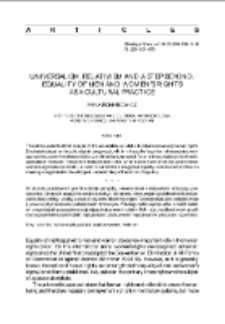
Object
Title: Universalism, Relativism and a Step Beyond. Equality of Men and Women’s Rights as a Cultural Practice
Subtitle:
Ethnologia Polona 29-30 (2008-2009)
Publisher:
Institute of Archaeology and Ethnology Polish Academy of Sciences
Place of publishing:
Description:
Type of object:
Abstract:
This article presents a brief analysis of the universalists vs. relativists debate concerning human rights. Emphasis is placed on the cultural practice approach, which in the author’s opinion is the accurate one in approaching power/knowledge relations, and therefore very useful for an anthropologist and eminently applicable in fieldwork. The author’s theses are exemplified by her studies in and of the non-governmental women’s organisations in Delhi, in order to demonstrate how gender equality is constructed and how its meaning is negotiated in the colloquial understanding of the notion of equality
References:
Beijing Declaration, 1995
Constitution of India, 1949
Convention on the Elimination of All Forms of Discrimination against Women, 1979
Cowan Jane K., Dembour Marie - Benedicte, Wilson Richard A., 2001, Introduction, [in:] Culture and rights. Anthropological perspectives, ed. by Cowan Jane K., Dembour Marie-Benedicte, Wilson Richard A., Cambridge University Press
Donelly Jack, 1989, Universal human rights in theory and practice, Cornell University Press
Douzinas Costas, 2007, Humans rights and empire. The philosophy of cosmopolitanism, Routledge– Cavendish, USA and Canada 2007
Goodale Mark 2009, Introduction: human rights and anthropology, [in:] Human rights: an anthropological reader, ed. By Mark Goodale, Blackwell Publishing
Jacobson Doranne, Wadley Susan S., 1992, Women in India. Two perspectives, New Delhi, South Asia Books
Krieger Linda, 1999, The burdens of equality: burdens of proof and presumptions in Indian and American civil rights law, The American Journal of Comparative Law, vol. 47, no. 1
Landman Todd, 2006, Studying human rights, Rutledge, London and New York
Mac Kinnon Catharine A., 2006, Sex equality under the constitution of India: problems, prospects and ‘personal laws’, Int’l J Con Law, vol. 4, no 2
Messer Ellen, 1993, Anthropology and Human Rights, Annual Review of Anthropology, 22
Nagengast Carole, Turner Terence, 1997, Introduction: universal human rights versus cultural relativity, Journal of Anthropological Research, vol. 53, no. 3, Universal Human Rights versus Cultural Relativity
Narayan Uma, 1998, Essence of culture and a sense of history: a feminist critique of cultural essentialism, “Hypatia”, 13, 2
Nussbaum Martha C., 2001, India: implementing sex equality through law, Chicago Journal of International Law, 37
Pels Peter, 2008, What has anthropology learned from the anthropology of colonialism?, Social Anthropology, 16, 3
Preamble, the Charter of the United Nations, 1945
SridharanIndhrani, 2000, Practicising human rights: a feminist perspective, [in:] Human rights in India. Historical, social and political perspective, ed. by C. J. Nirmal, Oxford University Press
Statement on Human Rights, 1947, American Anthropological Association, [in:] Human rights: an anthropological reader, ed. by Mark Goodale, Blackwell Publishing, 2009
Turner Terence, 1997, Human rights, human difference: anthropology’s contribution to an emancipatory cultural politics, Journal of Anthropological Research, vol. 53, no. 3, Universal Human Rights versus Cultural Relativity
Zechenter Elizabeth M., 1997, In the name of culture: cultural relativism and the abuse of the individual, Journal of Anthropological Research, vol. 53, no. 3, Universal Human Rights versus Cultural Relativity
Relation:
Volume:
Start page:
End page:
Detailed Resource Type:
Format:
Resource Identifier:
oai:rcin.org.pl:61470 ; 0137-4079
Source:
IAiE PAN, call no. P 366 ; IAiE PAN, call no. P 367 ; IAiE PAN, call no. P 368 ; click here to follow the link
Language:
Digitizing institution:
Institute of Archaeology and Ethnology of the Polish Academy of Sciences
Original in:
Library of the Institute of Archaeology and Ethnology of the Polish Academy of Sciences
Access:
Object collections:
- Digital Repository of Scientific Institutes > Partners' collections > Institute of Archeology and Ethnology PAS > Institute Publications
- Digital Repository of Scientific Institutes > Partners' collections > Institute of Archeology and Ethnology PAS > Institute Publications > Current Journals
- Digital Repository of Scientific Institutes > Literature > Journals/Articles
- Digital Repository of Scientific Institutes > Partners' collections > Institute of Archeology and Ethnology PAS > Institute Publications > Current Journals > Ethnologia Polona
Last modified:
Feb 2, 2022
In our library since:
Jan 10, 2017
Number of object content downloads / hits:
42
All available object's versions:
https://rcin.org.pl/publication/76157
Show description in RDF format:
Show description in RDFa format:
Show description in OAI-PMH format:
Objects Similar
Kubicka, Joanna

 INSTYTUT ARCHEOLOGII I ETNOLOGII POLSKIEJ AKADEMII NAUK
INSTYTUT ARCHEOLOGII I ETNOLOGII POLSKIEJ AKADEMII NAUK
 INSTYTUT BADAŃ LITERACKICH POLSKIEJ AKADEMII NAUK
INSTYTUT BADAŃ LITERACKICH POLSKIEJ AKADEMII NAUK
 INSTYTUT BADAWCZY LEŚNICTWA
INSTYTUT BADAWCZY LEŚNICTWA
 INSTYTUT BIOLOGII DOŚWIADCZALNEJ IM. MARCELEGO NENCKIEGO POLSKIEJ AKADEMII NAUK
INSTYTUT BIOLOGII DOŚWIADCZALNEJ IM. MARCELEGO NENCKIEGO POLSKIEJ AKADEMII NAUK
 INSTYTUT BIOLOGII SSAKÓW POLSKIEJ AKADEMII NAUK
INSTYTUT BIOLOGII SSAKÓW POLSKIEJ AKADEMII NAUK
 INSTYTUT CHEMII FIZYCZNEJ PAN
INSTYTUT CHEMII FIZYCZNEJ PAN
 INSTYTUT CHEMII ORGANICZNEJ PAN
INSTYTUT CHEMII ORGANICZNEJ PAN
 INSTYTUT FILOZOFII I SOCJOLOGII PAN
INSTYTUT FILOZOFII I SOCJOLOGII PAN
 INSTYTUT GEOGRAFII I PRZESTRZENNEGO ZAGOSPODAROWANIA PAN
INSTYTUT GEOGRAFII I PRZESTRZENNEGO ZAGOSPODAROWANIA PAN
 INSTYTUT HISTORII im. TADEUSZA MANTEUFFLA POLSKIEJ AKADEMII NAUK
INSTYTUT HISTORII im. TADEUSZA MANTEUFFLA POLSKIEJ AKADEMII NAUK
 INSTYTUT JĘZYKA POLSKIEGO POLSKIEJ AKADEMII NAUK
INSTYTUT JĘZYKA POLSKIEGO POLSKIEJ AKADEMII NAUK
 INSTYTUT MATEMATYCZNY PAN
INSTYTUT MATEMATYCZNY PAN
 INSTYTUT MEDYCYNY DOŚWIADCZALNEJ I KLINICZNEJ IM.MIROSŁAWA MOSSAKOWSKIEGO POLSKIEJ AKADEMII NAUK
INSTYTUT MEDYCYNY DOŚWIADCZALNEJ I KLINICZNEJ IM.MIROSŁAWA MOSSAKOWSKIEGO POLSKIEJ AKADEMII NAUK
 INSTYTUT PODSTAWOWYCH PROBLEMÓW TECHNIKI PAN
INSTYTUT PODSTAWOWYCH PROBLEMÓW TECHNIKI PAN
 INSTYTUT SLAWISTYKI PAN
INSTYTUT SLAWISTYKI PAN
 SIEĆ BADAWCZA ŁUKASIEWICZ - INSTYTUT TECHNOLOGII MATERIAŁÓW ELEKTRONICZNYCH
SIEĆ BADAWCZA ŁUKASIEWICZ - INSTYTUT TECHNOLOGII MATERIAŁÓW ELEKTRONICZNYCH
 MUZEUM I INSTYTUT ZOOLOGII POLSKIEJ AKADEMII NAUK
MUZEUM I INSTYTUT ZOOLOGII POLSKIEJ AKADEMII NAUK
 INSTYTUT BADAŃ SYSTEMOWYCH PAN
INSTYTUT BADAŃ SYSTEMOWYCH PAN
 INSTYTUT BOTANIKI IM. WŁADYSŁAWA SZAFERA POLSKIEJ AKADEMII NAUK
INSTYTUT BOTANIKI IM. WŁADYSŁAWA SZAFERA POLSKIEJ AKADEMII NAUK


































